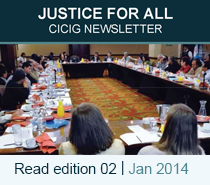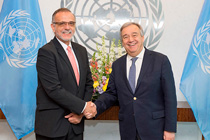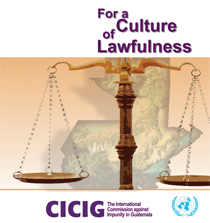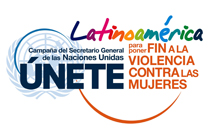|
INTRODUCTION
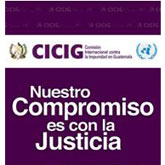 On the occasion of its two-year anniversary, the International Commission against Impunity in Guatemala (known by its Spanish acronym as CICIG) presents its executive summary of activities, results and challenges during this period, realized pursuant to its mandate as established by the Agreement between the Government of Guatemala and the United Nations. On the occasion of its two-year anniversary, the International Commission against Impunity in Guatemala (known by its Spanish acronym as CICIG) presents its executive summary of activities, results and challenges during this period, realized pursuant to its mandate as established by the Agreement between the Government of Guatemala and the United Nations.
The creation of CICIG was based on a decision by the Guatemalan State, not one person or a given President or Foreign Minister. Three different executive branches of the Government, each of them with a different Minister of Foreign Affairs, and two different Congresses and Constitutional Courts, both made up of different members, took part in the political decision, negotiation, signature and ratification of the Agreement creating the Commission. During that time, the Commission was the object of political debate during two electoral processes. Additionally, the Constitutional Court gave legal certainty to the work of CICIG through consultative opinions.
This would not have been possible without the attention and ongoing support of the international community and the constant commitment, impartial advice and search for solutions on the part of Guatemalan civil society. Few countries have the quantity of civil society organizations, each with its own viewpoint and sectoral interests, committed to creating a more democratic country and a justice system capable of fighting impunity. To everyone who has assisted CICIG from day one, we express our deepest gratitude.
CICIG’S MANDATE
CICIG was established pursuant to the Agreement entered into between the United Nations and the Government of Guatemala on 12 December 2006. This Agreement was ratified by the Congress of the Republic on 1 August 2007 and went into effect on 4 September 2007. In 2009, the President of the Republic and the United Nations Secretary General decided, through an exchange of notes, to extend CICIG’s mandate until 4 September 2011. Congress ratified the extension on 16 July 2009.
Dr. Carlos Castresana Fernández was appointed Commissioner, at the level of Assistant Secretary-General by the Secretary General in September 2007. The appointment was extended until September 2011.
Among its functions, the Commission is mandated to ascertain the existence of illegal security groups and clandestine security organizations; cooperate with the State in dismantling such groups and organizations; promote the investigation, criminal prosecution and punishment of crimes committed by their members; and, finally, recommend to the State the adoption of public policies aimed at eradicating such groups and organizations and preventing their reorganization. In addition to investigating cases contemplated in its mandate, the Commission may act as a complementary prosecutor in these cases and has the authority to initiate criminal and/or disciplinary actions before relevant authorities against public servants who obstruct the Commission’s activities or functions and thus contribute to impunity.
By the nature of the creation Agreement, CICIG is an independent body from the political, organizational and financial standpoint, as its budget is funded entirely through voluntary contributions from the international community.
ADMINISTRATION
Until December 2007, the Commission was made up of the Commissioner and five consultants. In January 2009, the initial team of approximately 17 individuals was hired, having been selected based on educational background, experience and professionalism, and following the gender and geographical distribution policies that govern the hiring of United Nations officials.
The Commission was installed thanks to the financial support provided by organizations such as FOSI, Soros and the European Union, and the governments of 12 countries: Canada, Denmark, Finland, Germany, Italy, the Netherlands, Norway, Spain, Sweden, Switzerland, the United Kingdom and the United States of America. With these voluntary contributions and the provision of experienced security and investigation specialists by the governments of Chile, Colombia, France, Spain, Sweden, Switzerland and Uruguay, the Commission is now incorporated by 156 national and international officials.
RELATIONSHIP WITH THE INTERNATIONAL COMMUNITY AND THE UNITED NATIONS
CICIG’s relationship with the international community is one of the pillars of its work. This support, which from the political and technical standpoint is fundamental, has also resulted in indispensible financial support. The support received in Guatemala was evidenced at different meetings held at the United Nations Headquarters in New York, where representatives of these countries pledged ongoing political support to CICIG’s activities. Within this framework, the United Nations General Assembly adopted a Resolution requesting that the Secretary General continue providing support to the Commission. This Resolution was adopted by consensus on November 10, 2008, and cosponsored by 55 countries.
CICIG is grateful for the support received and hopes to continue consolidating the international community’s commitment to Guatemala.
COOPERATION AGREEMENTS
During its first two years of existence, CICIG signed the following cooperation and exchange of information agreements that have allowed it to move forward with different activities in accordance with its mandate: bilateral cooperation agreement between the Public Prosecutor’s Office and CICIG, signed 27 February 2008; cooperation agreement between the First Lady’s Social Work Secretariat (SOSEP), the Office for the Protection of Indigenous Women (DEMI), the Presidential Secretariat for Women (SEPREM) and CICIG, signed 25 March 2008; bilateral cooperation agreement between the Tax Administration Bureau (SAT) and CICIG, signed 2 July 2008; interinstitutional agreement with the Ministry of the Interior, the Public Prosecutor’s Office and CICIG to establish and implement the wire tapping system, signed 24 November 2008; cooperation agreement between CICIG and UNICEF to conduct studies in favor of children and adolescents, signed 3 February 2009.
RELATIONSHIP WITH COUNTERPARTS
As the State of Guatemala is a signatory to the Agreement on the creation of CICIG and therefore the Commission’s natural counterpart, in its day-to-day work CICIG is in constant contact with three institutions that are fundamental in the fight against impunity: the Ministry of the Interior, the National Civilian Police (known by its Spanish acronym as PNC) and the Public Prosecutor’s Office. The first stage of CICIG’s work mainly consisted of building fluid working relationships and establishing mutual trust with its counterparts. This was achieved almost from the outset with the Ministry of the Interior, and particularly with Minister Vinicio Gómez. With the Public Prosecutor’s Office, good work coordination was recently established when Amílcar Velázquez Zárate took office as Attorney General. This led to the creation of the Special Prosecutor’s Office for CICIG. After the death of Minister Gómez, the constant turnover of Ministry of the Interior staff and high-level PNC officials has made it difficult to design and implement medium and long-term security plans, despite their extreme necessity. Progress has been made, however, in removing corrupt officials from the PNC and incorporating Guatemalan police officers into CICIG’s activities.
The training of 30 police officers began in July 2008, including a 348 hour classroom course in criminology and police investigation methods. From this group, 20 police officers were selected to begin a one-school-year field observation and modeling training course. These 20 officers were assigned to the Public Prosecutor’s Office to carry out investigation activities and provide security and protection to the public prosecutors; to CICIG headquarters for security and protection; and to provide logistical support, and security services, as well as act as coordinators and police liaisons for, CICIG’s international investigators in carrying out their operational functions.
SPECIAL PROSECUTOR’S OFFICE FOR CICIG
The Special Prosecutor’s Office for CICIG (known by its Spanish acronym as UEFAC) was established under the framework of the Agreement on the creation of CICIG and the bilateral cooperation agreement entered into by the Public Prosecutor’s Office and CICIG on 27 February 2008 in order to implement the Commission’s technical assistance and support of criminal investigations. However, the conditions that enabled UEFAC to begin its activities were not in place until 2 September 2008.
Guatemalan prosecutors and auxiliary prosecutors, who are supported in their investigative activities by the Coordination Office, which is staffed by international CICIG personnel, incorporate UEFAC.
UEFAC’s functions are divided into four areas: case investigations; coordination of prosecutors and auxiliary prosecutors; institutional strengthening; and training. UEFAC’s main function is to support investigative activities in cases that, due to the form in which they were executed and the characteristics of the perpetrators, shock the population, put witnesses and evidence in danger and weaken the public’s confidence in police and Public Prosecutor’s Office authorities. Various activities that seek to strengthen and professionalize the Public Prosecutor’s Office’s investigation and prosecution capacity have been carried out: coordination of meetings between the Public Prosecutor’s Office, PNC and Penitentiary System authorities aimed at establishing mechanisms that would permit the clear, consistent and orderly investigation of the murders of bus drivers; support in evaluating the Public Prosecutor’s Office’s Crimes against Women Unit, which has a considerable investigation backlog; and workshops on CICIG’s mandate and its incorporation into the national normative and operational framework of criminal justice administration. The Coordination Office has also provided technical assistance to PNC officials, particularly regarding wire tapping, the right to privacy, fundamental guarantees and due process and investigation plans.
JUDICIAL INVESTIGATIONS AND PROCEEDINGS
CICIG as complementary Prosecutor (Querellante Adhesivo)
25 March 2008 Massacre in Zacapa. A clash between two illegal, armed groups in the Municipality of Rio Hondo, Department of Zacapa, left nine dead, six wounded and six in custody. Subsequent investigations led to the capture of five additional suspects. The evidentiary hearing was held on 9 July 2009, and the date and time for the initiation of the trial have yet to be determined. Acting as a complementary prosecutor for the first time under its mandate, CICIG demonstrated its commitment to reinforcing the Public Prosecutor’s Office’s procedural position in cases in which, given the accused criminal group’s capacity for violence and corruption, the Commission’s presence is indispensible in ensuring the strength and aptness of the accusation.
The Matus Case. The Defendant was the head of the Public Prosecutor’s Office’s Crimes against Life and Personal Integrity Unit. The case stems from the murder of Víctor Rivera Azuaje, a former advisor to the Ministry of the Interior. Álvaro Matus is accused of abuse of authority and dereliction of duty. To date, four other individuals (current and former Public Prosecutor’s Office officials) have been linked to the case and charged with conspiracy and obstruction of justice. The case has been suspended due to a conflict of jurisdiction appeal, and the accusatory hearing and trial are pending. In this case, CICIG assumed for the first time the task of initiating criminal proceedings to remove corrupt officials from justice system institutions.
The Portillo Case. Alfonso Antonio Portillo Cabrera, President of Guatemala from 2000 to 2004, was handed over by Mexican authorities to their Guatemalan counterparts on 7 October 2008, based on an extradition petition filed in 2005 for the crime of embezzlement. The accusation is based on the removal of approximately US 15 Million from the Ministry of Defence’s budget in 2001, of which at least US 3.75 Million were personally invested by former President Alfonso Portillo for his own benefit. The investigation links the Defendant to other high-level officials within his administration for misappropriating more than US 50 Million. Judicial proceedings are in the intermediary stage before the case is brought to trial.
Eduardo Arévalo Lacs, Minister of Defence during President Portillo’s administration in 2001, signed Government Resolution No. 16-2001, which made it possible to amend the Ministry of Defence’s budget in the amount of US 15 Million.
Retired military officers Napoleón Rojas Méndez and Jacobo Esdras Salán Sánchez, who were President Alfonso Antonio Portillo Cabrera’s Security Advisor and confidant, respectively, also took part in the crime. On 25 June 2009, the Eighth Criminal Court of Guatemala issued an arrest warrant against the three suspects for the crime of embezzlement. Of the three, only Eduardo Arévalo Lacs has been arrested. Subsequently, a formal accusation was filed against him for embezzlement and bond was set at US 5 Million, which was lowered on two separate occasions: first to US 625,000 and then to US 500,000. It has not been possible to apprehend the other two suspects and the relevant information has been given to Interpol.
Retired General Enrique Ríos Sosa, together with Miguel Angel Salguero Torres, Luis Alberto Gómez Guillermo, Sergio Hugo Cárdenas Sagastume, Randolfo Leonel Chacón Alvarez and Pedro Adolfo Catalán Muñoz, are accused of being directly involved in the removal of various sums of money totaling approximately US 55 Million from the national treasury in 2001 and 2002 in their capacity as Ministry of Defense officials. On 25 March 2009, the Duty Judge in a Guatemala City Criminal Court issued arrest warrants against the former officials and ordered them to house arrest.
The Case of the PNC Officers. Four members of the PNC (a captain, a lieutenant and two police officers) are being tried for the crimes of illegal detention, aggravated theft and simulation of a crime. This case exemplifies the corruption and presence of illegal bodies in the PNC. The case is on trial.
Amparos and Appeals Challenging CICIG’s Constitutionality
CICIG’s participation in investigative and procedural activities has been confronted with amparos and constitutional challenges. In general, all of them put forward the following arguments: investigations and criminal proceedings conducted by a prosecutor’s office that “reports” to CICIG violates due process, the right to a defence and the principle of non-retroactivity of the law; the appellant does not belong to an illegal security group or clandestine security organization; the Agreement on the creation of CICIG, and hence its participation in the investigation and/or as a complementary prosecutor, cannot be applied retroactively because the facts occurred before the signature and entry into force of the Agreement. Despite these appeals and the difficulties they present in taking cases to trial, the Commission has advanced in constitutional matters. In general, the decisions of the lower courts and the Constitutional Court have been favorable, confirming that CICIG has acted in accordance with constitutional norms.
Investigations
CICIG and UEFAC are carrying out 39 investigations with the aim of determining the existence of illegal security groups or clandestine security organizations, their structures, modus operandi, source of funding and possible links to State entities or agents and other sectors that threaten civil and political rights in Guatemala. The investigations summarized below are those that can be published at this time. All other ongoing investigations are strictly confidential.
The Nicaraguan Bus Case. A bus traveling from Nicaragua to Guatemala City was found on 8 November 2008 in the Department of Zacapa, abandoned and engulfed in flames. The bodies of 16 people were found inside the bus. Work at the crime scene and later work done by experts determined that most had died from gunshot wounds. The investigation was initiated by the Public Prosecutor’s Office in Zacapa and transferred a few days later to UEFAC, which, with the support of CICIG, the PNC, DINC-SAIA and INACIF in coordination with the Public Prosecutor’s Office of Nicaragua, carried out a number of inquiries and searches. As the investigation progressed, the manner in which the victims were murdered was established and the criminal organization that planned, organized and executed the crime was identified: a structure dedicated to trafficking in cocaine and arms, murder for hire, money laundering and other crimes. On 29 June 2009, UEFAC presented the formal accusations in the Zacapa Criminal Court against Juan Carlos Policarpio Chinchilla for the crimes of murder, conspiracy and illegal association and against Eduardo Terraza Hernández, who is accused of covering up the crime. The Criminal Chamber of the Supreme Court subsequently granted the Attorney General’s request to transfer the case to Guatemala City courts to continue with the proceedings. The hearing to set the trial date is pending.
Víctor Rivera Case. On 7 April 2008, former advisor to the Ministry of the Interior, Víctor Josué Rivera Azuaje, was murdered as he was driving in Guatemala City accompanied by his secretary, María de Rosario Melgar Martínez, who was injured. The investigation was transferred to UEFAC in October 2008. However, CICIG determined that the crime scene investigation, the chain of custody of recovered evidence, the handling of witnesses and informants and some investigative tasks had been manipulated by Álvaro Matus, the former head of the Public Prosecutor’s Office’s Crimes against Life and Personal Integrity Unit. A study of criminal events that took place after the attack revealed that several informants who worked for the Anti-kidnapping Unit of the Ministry of the Interior, which was advised by Victor Rivera, were subsequently murdered. The investigation is ongoing.
Galindo Case. Moisés Eduardo Galindo Ruiz and former Infantry Colonel Luis Catarino Estrada Valenzuela, are accused of embezzlement and tampering with public documents in their capacity as Ministry of Defence officials in 2001. The investigation was transferred to UEFAC in November 2008. The case is linked to the case against former President Portillo.
Byron Vargas Case. On 28 April 2008, in Estanzuela, Department of Zacapa, three young girls were shot at close range and killed. The investigation was initially overseen by the Zacapa Public Prosecutor’s Office. Byron Humberto Vargas Sosa was identified by the mother of one of the victims as the perpetrator. In October 2008, UEFAC took over the case, moving the investigation forward and obtaining a concrete identification of the principal suspect. On 15 February 2009, Byron Vargas was detained by PNC officers while carrying a large number of firearms. At Vargas Sosa’s first hearing, UEFAC formalized charges against him for triple murder. The formal accusation of murder was accepted by the First Criminal Court of the Department of Zacapa. In the course of the investigation, Esteban Bolvito Pérez and Mario Enrique Cojoc Quej were identified as suspects who participated in the crime with Vargas Sosa, and they were charged with murder. In June 2009, the Criminal Chamber of the Supreme Court granted the Attorney General’s request to transfer the process to Guatemala City courts. The hearing to set the trial date is pending.
Rosenberg Case. Attorney Rodrigo Rosenberg Marzano was murdered in Guatemala City on 10 May 2009. The Public Prosecutor’s Office’s Crimes against Life and Personal Integrity Unit began the investigation with DICRI’s crime scene team. On 14 May 2009, the case was transferred to UEFAC where evidence is being collected in order to identify the material and intellectual authors of the crime.
Musa Case. On 14 April 2009, as Mr. Khalil Musa and his daughter Marjorie Musa Maldonado were on their way home in Guatemala City, they were intercepted by armed individuals on a motorcycle who opened fire and killed them. The ongoing investigation was initiated by the Public Prosecutor’s Office’s Crimes against Life and Personal Integrity Unit and transferred to UEFAC on 15 May 2009.
Amatitlán Case. On 24 April 2009, SAIA units went to a warehouse complex located on the highway from Guatemala City to the Pacific Ocean to conduct an anti-drug operation. They were met with resistance, which resulted in a confrontation that left five dead. The search of one of the vehicles left behind by the assailants yielded a rocket propelled grenade launcher, rifles and ammunition. Three hundred and seventy kilograms of cocaine were found in another vehicle. A search of the warehouse yielded additional packages of cocaine that were ready for shipment, a large amount of military armaments and 13 vehicles, including trucks and vans, some with Mexican and U.S. license plates. The first investigative tasks were carried out by the Public Prosecutor’s Office in Escuintla with the support of the Public Prosecutor’s Office’s Anti-narcotics Unit, which then took over the investigation. The case was subsequently transferred to UEFAC. The investigation seeks to determine what transpired and identify the members of the drug trafficking organization who owned the narcotics and caused the death of the PNC-SAIA officers.
LEGAL REFORM PROPOSALS
Within the framework of CICIG’s mandate, two legal reform packages that seek to improve the legal and institutional framework of the criminal prosecution of crimes that fall under CICIG’s jurisdiction were presented to relevant national authorities. The first package, submitted in October 2008, contains the following proposals: amendments to the Law on Arms and Ammunition; amendments to the Law on Amparo, Habeas Corpus and Constitutionality; amendments to the Law on Immunities; reforms to the Code of Criminal Procedure (Decree No. 51-92) regarding criminal procedure and the use of audiovisual means in witness and expert testimony; and reforms to Decree No. 21-2006 and Resolution No. 2-2007 of the Public Prosecutor’s Office regarding the relocation and change of identity of witnesses and collaborators in criminal proceedings. The second package, submitted in June 2009, contains the following proposals: the Law on Jurisdiction in High-Risk Criminal Proceedings; reforms to the Law against Organized Crime with regard to the effective collaboration of defendant-informants; amendments to the Law on Amparo, Habeas Corpus and Constitutionality; amendments to the Law on Immunities; reforms to the Law on Arms and Ammunition; reforms to the Criminal Code and the Law against Organized Crime with regard to anti-corruption; reforms to the Criminal Code, the Law against Organized Crime and the Law on Immigration with regard to human trafficking and trafficking in migrants; reforms to various laws with regard to disciplinary measures in the criminal justice system; the Law of International Legal Assistance and reforms to the Law on Extradition Procedures.
CICIG’s work in the area of legal reform proposals and technical assistance to Congress has resulted in the approval of four essential laws: the Law on Arms and Ammunition; the Law to Strengthen Criminal Prosecutions; the Law on Jurisdiction in High-Risk Criminal Proceedings; and reforms to the Law against Organized Crime, specifically in the area of effective collaboration of defendant-informants.
RESULTS
Without a doubt, CICIG’s work during the last two years has resulted in greater awareness by various sectors of Guatemalan society of the existence of organized crime and high rates of impunity and the urgent need to combat it. These topics have become crosscutting issues in national life and matters of interest to everyone because they affect everyone. It should also be emphasized that despite the many setbacks suffered in the last two years, the Public Prosecutor’s Office has carried out some positive actions, including the investigation and prosecution of high-impact crimes, and it is hoped that this will continue in the future.
With the support of the international community, many activities have been carried out in the area of technical assistance in order to improve the capacity of justice system institutions. Within this framework, the strengthening of the national witness protection programme should be mentioned, which has included the drafting of regulations and protocols, support in identifying safe houses and the training of the programme’s security officers and staff by CICIG personnel and members of the U.S. Marshals Service, among other activities. Several activities were also carried out to support the establishment of the Communications Monitoring Centre, as well as to obtain the necessary equipment and train the officers in charge of the Centre. The wiretapping system has been operational since June 2009.
CHALLENGES
CICIG has faced major challenges during its first two years, but they are not different from those faced by Guatemala in overcoming impunity and enabling the effective enjoyment of its citizens’ rights. The extension of CICIG’s mandate provides the necessary time to achieve the results that were set at the beginning of the mandate, but this will not be possible without the necessary tools such as the approval of outstanding legislative reforms, financial resources for justice system institutions and the decisive political commitment of Guatemalan authorities and citizens. Specifically, the installation of the courts created under the Law on Jurisdiction in High-Risk Criminal Proceedings (Decree Nº 21-2009) is necessary. With the approval of these courts, the creation of a maximum security judicial centre to house them as well as a maximum security prison has become even more necessary.
Regarding the Judiciary, an important challenge will be the integration of new Supreme Court Judges to guarantee the independent and effective administration of justice.
The National Agreement for the Advancement of Security and Justice will continue to receive CICIG’s support in order to realize the initiatives included therein and establish medium and short-term plans that clearly outline the responsibilities of each of the players and institutions involved, funding needs and implementation deadlines. But the Commission cannot turn the good intentions enshrined in this Agreement into a reality without the commitment and effort of the State of Guatemala.
CICIG’s greatest challenge will be to identify those justice officials whose commitment to their work and good practices in the exercise of their duties demonstrate that it is possible to obtain better justice for all.
CONCLUSION
In CICIG’s first two years of work, Guatemalan authorities and civil society and the international community have together set a course that marks a new direction in the area of justice. We express our appreciation to those who have remained steadfast in their support of the Commission, to those who had misgivings at the beginning but later offered their support, to the media and to each and every honorable Guatemalan man and woman who demonstrate, through their day-to-day activities, that the dream of a country free of impunity can come true.
|


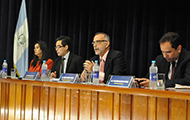
 On the occasion of its two-year anniversary, the International Commission against Impunity in Guatemala (known by its Spanish acronym as CICIG) presents its executive summary of activities, results and challenges during this period, realized pursuant to its mandate as established by the Agreement between the Government of Guatemala and the United Nations.
On the occasion of its two-year anniversary, the International Commission against Impunity in Guatemala (known by its Spanish acronym as CICIG) presents its executive summary of activities, results and challenges during this period, realized pursuant to its mandate as established by the Agreement between the Government of Guatemala and the United Nations.
